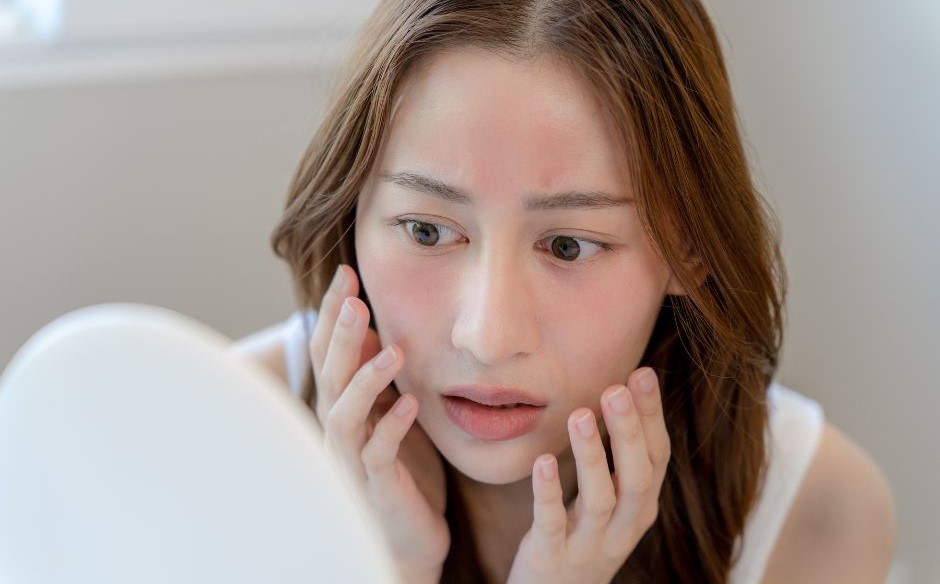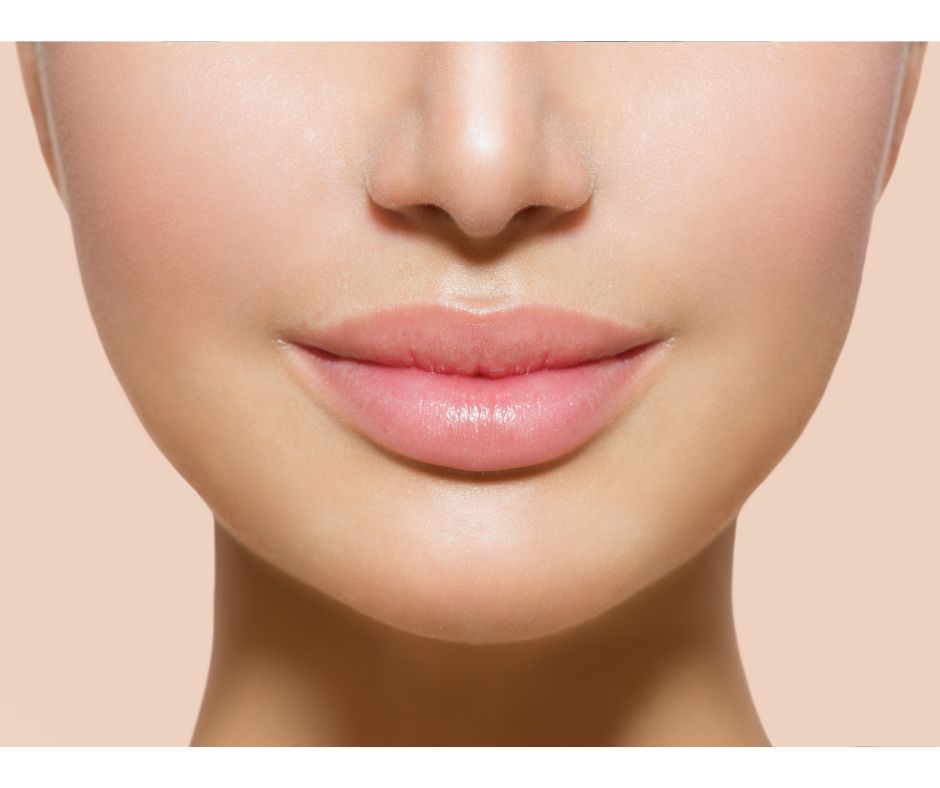Do you find yourself constantly battling with redness, irritation, and flare-ups on your delicate skin? If so, this blog post is a must-read. We understand the struggles of sensitive skin and the challenges it brings.
In this article, we’ll delve into the causes and symptoms of sensitive skin, share tips on choosing the right products, provide a daily skincare routine tailored for sensitive skin, and even dive into special care for sensitive areas like the eyes and lips.
We’ll also explore the importance of protecting your skin from harmful environmental factors and how self-care practices can be incorporated into your skincare routine.
Table of Contents
Understanding Sensitive Skin: Causes and Symptoms

Before we delve into the topic of choosing the right products for sensitive skin, it is essential to gain a deeper understanding of what causes sensitive skin and the symptoms you might experience. Sensitive skin can be a result of various factors, including genetics, environmental irritants, allergies, and underlying skin conditions.
One of the primary causes of sensitive skin is a weakened skin barrier. Your skin’s barrier function acts as a protective shield, keeping irritants out and moisture in. When this barrier is compromised, it becomes easier for allergens and irritants to penetrate your skin, leading to sensitivity.
Factors such as harsh weather conditions, excessive use of harsh skincare products, and over-exfoliation can all contribute to a weakened barrier.
Another common cause of sensitive skin is allergies. Some individuals are more prone to developing allergic reactions to certain ingredients found in skincare products, such as fragrances, preservatives, and dyes. These allergies can manifest as redness, itching, swelling, or even breakouts.
Skin conditions like rosacea and eczema can also make your skin more sensitive and prone to irritation. Rosacea is a chronic inflammatory skin condition characterized by facial redness, visible blood vessels, and sometimes even acne-like bumps. Eczema, on the other hand, leads to dry, itchy, and inflamed skin.
When it comes to the symptoms of sensitive skin, they can vary from person to person. Some common signs include redness, dryness, itching, and a burning or stinging sensation. You may also experience flare-ups triggered by certain skincare products, environmental factors, stress, or hormonal changes.
Choosing the Right Products: Ingredients to Look For and Avoid
When it comes to choosing skincare products for sensitive skin, it’s essential to pay close attention to the ingredients. Certain ingredients can be soothing and beneficial for sensitive skin, while others can trigger irritation and flare-ups. By knowing what to look for and what to avoid, you can create a personalized skincare routine that nourishes and protects your delicate beauty.
- Choose Gentle Products:- Natural ingredients like aloe vera, chamomile, and oat extract are known for their soothing properties and can help calm and hydrate sensitive skin. These ingredients have anti-inflammatory effects and can reduce redness, dryness, and itching, providing much-needed relief.
- Choose Fragrance-free Products:- Fragrances are a common irritant for sensitive skin and can lead to redness, itching, and other uncomfortable reactions. Opt for products labeled as “fragrance-free” or “unscented” to minimize the risk of irritation.
- Choose Chemical-free Products:- such as sulfates, parabens, and artificial dyes can aggravate sensitive skin. These ingredients can strip the skin of its natural moisture barrier and cause dryness and inflammation. Look for products that are free from these harsh components, opting instead for gentle cleansers, moisturizers, and serums that are specifically formulated for sensitive skin.
- Avoid exfoliating products that contain abrasive particles or strong acids:- While exfoliation can be beneficial for removing dead skin cells and promoting cell turnover, it’s important to choose gentle exfoliants that won’t cause micro-tears or further irritate sensitive skin. Look for products with fine particles like jojoba beads or enzymatic exfoliators that work gently without causing damage.
By being selective with the ingredients in your skincare products, you can avoid potential irritants and nourish your sensitive skin effectively. Now that you know what to look for and what to avoid, let’s dive into the daily skincare routine specifically designed for sensitive skin.,
Rose Essential Oil has Tremendous Skin Benefits. CHECK OUT HERE
Daily Skincare Routine for Sensitive Skin

When it comes to caring for sensitive skin daily, it’s important to follow a gentle yet effective skincare routine. This routine will help to maintain the delicate balance of your skin while providing it with the necessary hydration and nourishment it needs.
- First, start by cleansing your face every morning and evening using a mild and fragrance-free cleanser. Look for a gentle cleanser that is specifically formulated for sensitive skin, as it will help to remove impurities without stripping away the skin’s natural oils. Avoid using hot water, as it can further irritate your skin, and instead opt for lukewarm water.
- After cleansing, apply a soothing and lightweight moisturizer that is designed for sensitive skin. Look for moisturizers that are free of harsh chemicals and artificial fragrances, as these can trigger irritation. Instead, choose products that contain calming ingredients like aloe vera, chamomile, and oat extract, which can help to soothe and hydrate your skin.
- In the morning, it’s important to protect your sensitive skin from the sun’s harmful rays. Apply a broad-spectrum sunscreen with an SPF of 30 or higher, even on cloudy days. Look for sunscreens that are specifically labeled as “gentle” or “sensitive skin-friendly,” as these will be less likely to irritate.
- At night, consider using a gentle and hydrating facial oil or serum to replenish your skin while you sleep. Look for products that are free of potential irritants like sulfates, parabens, and synthetic fragrances. These oils and serums can help to nourish your skin and improve its overall texture and tone.
- Lastly, be cautious of exfoliating products that contain abrasive particles or strong acids. While exfoliation can be beneficial for removing dead skin cells and promoting cell turnover, it’s important to choose gentle exfoliants that won’t cause micro-tears or further irritate sensitive skin. Look for products with fine particles like jojoba beads or enzymatic exfoliators that work gently without causing damage.
Special Care for Sensitive Areas: Eyes and Lips

With a thorough understanding of how to care for your sensitive skin, it’s time to turn our attention to those delicate areas that require specialized attention: the eyes and lips. These areas are particularly prone to irritation and sensitivity, making it crucial to adopt a gentle approach when it comes to their care.
- When it comes to the eyes, it’s essential to choose products that are specifically formulated for this sensitive area. Look for eye creams or serums that are fragrance-free and have a lightweight, non-greasy texture. Avoid any products that contain harsh ingredients such as alcohol or synthetic fragrances, as these can lead to redness, dryness, and discomfort.
For removing eye makeup, opt for gentle, oil-based cleansers or micellar water specifically designed for the sensitive eye area. These products effectively dissolve makeup without tugging or rubbing the delicate skin around the eyes. Remember to always be gentle when removing makeup, using soft cotton pads or a clean, soft cloth to avoid any unnecessary friction.
- When it comes to the lips, hydration is the key. Look for lip balms or treatments that are free of potentially irritating ingredients such as artificial fragrances, colorants, or flavors. Instead, opt for products that contain natural ingredients like shea butter, beeswax, or coconut oil, which provide nourishment and moisture without causing any further irritation.
Additionally, consider using lip products with built-in SPF protection to shield your delicate lips from the harmful effects of the sun. The skin on the lips is thinner and more sensitive, making it susceptible to sunburn and damage. By incorporating a lip balm or lipstick with SPF into your daily routine, you can help prevent sunburn, dryness, and the premature aging of your lips.
By paying special attention to the needs of your eyes and lips, you can ensure that your sensitive skin receives the utmost care and protection. Now that we have covered the essentials for these sensitive areas, let’s delve into the next section, where we will explore how to safeguard your skin from the damaging effects of the sun and environmental factors.,
Protecting Your Skin: Sunscreen and Environmental Factors

In addition to the specialized care required for your eyes and lips, it is crucial to shield your entire face and body from the harmful effects of the sun and environmental factors. Sunscreen should be an essential component of your daily skincare routine, especially if you have sensitive skin.
Opt for a broad-spectrum sunscreen with an SPF of at least 30 to safeguard against both UVA and UVB rays. This will help protect your delicate skin from sunburn, premature aging, and the increased risk of skin cancer.
When choosing a sunscreen, look for products specifically formulated for sensitive skin. These are often free of harsh chemicals, fragrances, and other potential irritants that can trigger reactions. Mineral-based sunscreens containing ingredients like zinc oxide and titanium dioxide are well-suited for sensitive skin, as they provide a physical barrier that reflects UV rays away from your skin.
Remember to apply sunscreen generously, at least 15 minutes before sun exposure, and reapply every two hours or more frequently if you are sweating or swimming.
Additionally, protect yourself from the sun’s harmful rays by seeking shade, wearing protective clothing, and using wide-brimmed hats and sunglasses.
Apart from the sun, other environmental factors can also impact your sensitive skin. Pollution, harsh weather conditions, and indoor heating or cooling systems can all contribute to skin sensitivity and irritation.
To combat these factors, consider using skincare products with antioxidants, such as vitamin C and green tea extract, which help protect your skin from environmental damage. Moisturizers containing hyaluronic acid can also help hydrate and soothe sensitive skin, forming a protective barrier against external aggressors.
By safeguarding your skin from the damaging effects of the sun and environmental factors, you can maintain its delicate beauty and reduce the risk of irritation or flare-ups. Now, let’s move on to the next section, where we will explore how incorporating self-care practices into your skincare routine can further nurture and support your sensitive skin.,
Incorporating Self-Care Practices into Your Skincare Routine

Now, let’s move on to exploring how incorporating self-care practices into your skincare routine can further nurture and support your sensitive skin.
Taking care of your skin is not just about the products you use, but also about the overall approach you have towards self-care. By incorporating self-care practices into your skincare routine, you can create a holistic and nurturing experience for your sensitive skin.
- Dedicated Time:- Start by carving out dedicated time for your skincare routine. Make it a ritual that you look forward to and enjoy. Whether it’s in the morning or evening, find a quiet and peaceful space where you can focus on yourself and your skin. Consider creating a calming ambiance by playing soft music, lighting scented candles, or using essential oils to create a relaxing atmosphere.
- Application:- Instead of rushing through the process, take your time and be gentle with your skin. Use your fingertips to massage the products in circular motions, allowing them to penetrate your skin effectively. This gentle massage not only ensures proper absorption but also promotes blood circulation, giving your skin a healthy glow.
- Emotional Well-Being:- Stress and anxiety can exacerbate skin sensitivity, so incorporating stress-reducing practices into your skincare routine can be highly beneficial. Consider incorporating mindfulness techniques, such as deep breathing exercises or meditation, before or after applying your skincare products. This will help you relax, alleviate any tension, and create a sense of calmness.
- Sleep:- Lack of sleep can affect your skin’s health and make it more prone to sensitivity and irritation. Establish a bedtime routine that includes winding down before bed, avoiding electronic devices, and creating a serene environment in your bedroom. Getting enough quality sleep will not only benefit your overall well-being but also contribute to the overall health and beauty of your sensitive skin.
Incorporating self-care practices into your skincare routine goes beyond just the physical aspect of skincare. It allows you to nurture your mind, body, and soul, creating a harmonious and balanced approach to skincare. By taking care of yourself holistically, you can support your sensitive skin in the best possible way.
With these self-care practices integrated into your skincare routine, you are now equipped with the tools to not only protect your sensitive skin from external aggressors but also enhance its natural beauty from within.
CONCLUSION
In conclusion, sensitive skin requires special attention and care to maintain a calm and resilient complexion. By understanding the causes and symptoms of sensitivity, choosing the right products, establishing a daily skincare routine, and giving extra care to sensitive areas, you can take control of your delicate beauty.
Remember to protect your skin from harmful sun rays and environmental factors, while also incorporating self-care practices into your skincare routine. With these expert tips and recommendations, you can achieve the benefits of healthy and beautiful skin.
Start implementing these practices today and embrace the soothing peace that comes with taking care of your sensitive skin.
Articles You Might Like:



